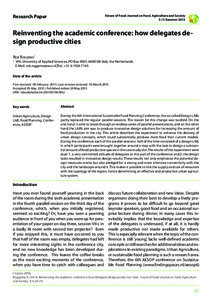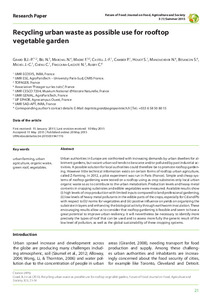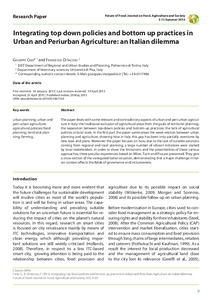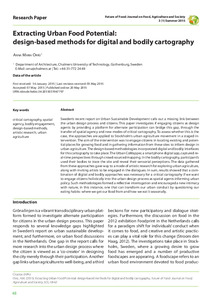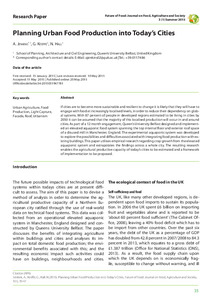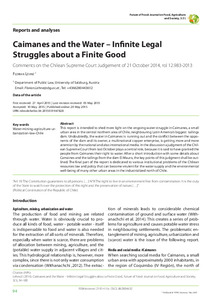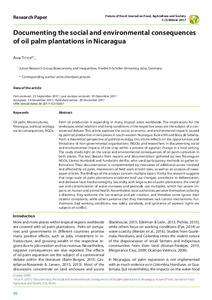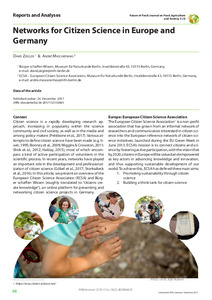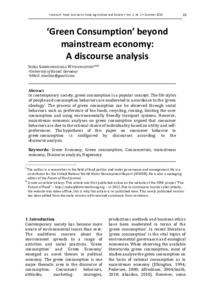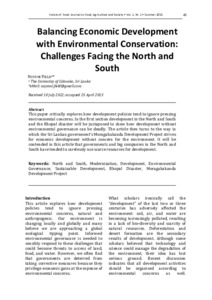Suche
Anzeige der Dokumente 1-10 von 84
Aufsatz
 Reinventing the academic conference: how delegates design productive cities
Reinventing the academic conference: how delegates design productive cities
(Department of Organic Food Quality and Food Culture at the University of Kassel, Germany and Federation of German Scientists (VDW), 2015-05-20)
During the 6th International Sustainable Food Planning Conference, the so-called Design LABs partly replaced the regular parallel sessions. The reason for this change was twofold. On the one hand it aims to break through an endless series of parallel presentations, and on the other hand the LAB’s aim was to produce innovative design solutions for increasing the amount of food production in the city. This article describes this experiment to enhance the delivery of urban design concepts, which could substantially ...
Aufsatz
 Recycling urban waste as possible use for rooftop vegetable garden
Recycling urban waste as possible use for rooftop vegetable garden
(Department of Organic Food Quality and Food Culture at the University of Kassel, Germany and Federation of German Scientists (VDW), 2015-05-20)
Urban authorities in Europe are confronted with increasing demands by urban dwellers for allotment gardens, but vacant urban soil tends to be scarce and/or polluted by past industrial activities. A possible solution for local authorities could therefore be to promote rooftop gardening. However little technical information exists on certain forms of rooftop urban agriculture, called Z-Farming. In 2012, a pilot experiment was run in Paris (France). Simple and cheap systems of rooftop gardening were tested on a rooftop ...
Aufsatz
 Integrating top down policies and bottom up practices in Urban and Periurban Agriculture: an Italian dilemma
Integrating top down policies and bottom up practices in Urban and Periurban Agriculture: an Italian dilemma
(Department of Organic Food Quality and Food Culture at the University of Kassel, Germany and Federation of German Scientists (VDW), 2015-05-20)
The paper deals with some relevant and contradictory aspects of urban and peri-urban agriculture in Italy: the traditional exclusion of agricultural areas from the goals of territorial planning; the separation between top-down policies and bottom-up practices; the lack of agricultural policies at local scale. In the first part the paper summarises the weak relation between urban planning and agriculture, showing how in Italy this gap has been only partially overcome by new laws and plans. Moreover the paper focuses ...
Aufsatz
 Extracting Urban Food Potential: design-based methods for digital and bodily cartography
Extracting Urban Food Potential: design-based methods for digital and bodily cartography
(Department of Organic Food Quality and Food Culture at the University of Kassel, Germany and Federation of German Scientists (VDW), 2015-05-20)
Sweden’s recent report on Urban Sustainable Development calls out a missing link between
the urban design process and citizens. This paper investigates if engaging citizens as design
agents by providing a platform for alternate participation can bridge this gap, through the
transfer of spatial agency and new modes of critical cartography. To assess whether this is the
case, the approaches are applied to Stockholm’s urban agriculture movement in a staged intervention.
The aim of the intervention was to engage ...
Aufsatz
 Planning Urban Food Production into Today's Cities
Planning Urban Food Production into Today's Cities
(Department of Organic Food Quality and Food Culture at the University of Kassel, Germany and Federation of German Scientists (VDW), 2015-05-20)
If cities are to become more sustainable and resilient to change it is likely that they will have to engage with food at increasingly localised levels, in order to reduce their dependency on global systems. With 87 percent of people in developed regions estimated to be living in cities by 2050 it can be assumed that the majority of this localised production will occur in and around cities. As part of a 12 month engagement, Queen’s University Belfast designed and implemented an elevated aquaponic food system spanning ...
Aufsatz
 Caimanes and the Water - Infinite Legal Struggles about a Finite Good
Caimanes and the Water - Infinite Legal Struggles about a Finite Good
(Department of Organic Food Quality and Food Culture at the University of Kassel, Germany and Federation of German Scientists (VDW), 2015-05-20)
This report is intended to shed more light on the ongoing water struggle in Caimanes, a small
urban area in the central northern area of Chile, neighbouring Latin America’s biggest tailings
dam. Undoubtedly, the water in Caimanes is running out and the conflict between the opponents
of the dam and its owner, a multinational copper enterprise, is getting more and more
attention by the national and also international media. In the discussion a judgment of the Chilean
Supreme Court from last October plays a central ...
Aufsatz
 Documenting the social and environmental consequences of oil palm plantations in Nicaragua
Documenting the social and environmental consequences of oil palm plantations in Nicaragua
(Department of Organic Food Quality and Food Culture at the University of Kassel, Germany and Federation of German Scientists (VDW), 2017-12-29)
Palm oil production is expanding in many tropical areas worldwide. The implications for the landscape, social relations and living conditions in the respective areas are the subject of a controversial debate. This article explores the social, economic, and environmental impacts caused by palm oil production in two places in south-eastern Nicaragua: Kukra Hill and Boca de Sábalos. From a theoretical perspective of political ecology, this article reflects on the opportunities and limitations of non-governmental ...
Aufsatz
 Networks for Citizen Science in Europe and Germany
Networks for Citizen Science in Europe and Germany
(Department of Organic Food Quality and Food Culture at the University of Kassel, Germany and Federation of German Scientists (VDW), 2017-12-26)
Citizen science is a rapidly developing research approach, increasing in popularity within the science community and civil society, as well as in the media and among policy-makers (Pettibone et al., 2017).
Aufsatz
 ‘Green Consumption’ beyond mainstream economy: A discourse analysis
‘Green Consumption’ beyond mainstream economy: A discourse analysis
(Department of Organic Food Quality and Food Culture at the University of Kassel, Germany and Federation of German Scientists (VDW), 2013)
In contemporary society, green consumption is a popular concept. The life styles of people and consumption behaviors are moderated in accordance to the ‘green ideology’. The process of green consumption can be observed through social behaviors such as preference of bio foods, recycling, reusing, limiting the over consumption and using environmentally friendly transport systems. However, mainstream economic analyses on green consumption argued that consumer behaviors are due to the rational choice of individuality ...
Aufsatz
 Balancing Economic Development with Environmental Conservation: Challenges Facing the North and South
Balancing Economic Development with Environmental Conservation: Challenges Facing the North and South
(Department of Organic Food Quality and Food Culture at the University of Kassel, Germany and Federation of German Scientists (VDW), 2013-04-25)
This paper critically explores how development policies tend to ignore pressing environmental concerns. In the first section development in the North and South and the Bhopal disaster will be juxtaposed to show how development without environmental governance can be deadly. The article then turns to the way in which the Sri Lankan government’s Moragahakanda Development Project strives for economic development without concern for the environment. It will be contended in this article that governments and big companies ...

